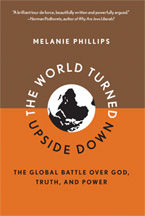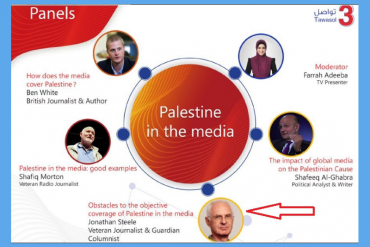This is a cross-post by Chas Newkey-Burden of Oy Va Goy
 There is a chilling scene in the film Body Snatchers, in which one of the ’snatched’ characters warns one of the few remaining human beings that his time is nearly up. “Where you gonna go, where you gonna run, where you gonna hide?” she asks him. “Nowhere… cos there’s no one like you left.” I think a lot of us who defend Israel can relate to that sense of isolation. In the wake of the reaction to the flotilla incident I’ve felt an unprecedented sense of despair that when it comes to these sorts of issues the world is abandoning reason.
There is a chilling scene in the film Body Snatchers, in which one of the ’snatched’ characters warns one of the few remaining human beings that his time is nearly up. “Where you gonna go, where you gonna run, where you gonna hide?” she asks him. “Nowhere… cos there’s no one like you left.” I think a lot of us who defend Israel can relate to that sense of isolation. In the wake of the reaction to the flotilla incident I’ve felt an unprecedented sense of despair that when it comes to these sorts of issues the world is abandoning reason.
So, in truth, it was with a slight sense of trepidation that I turned to Melanie Phillips’ new book The World Turned Upside Down. Although I am a fan of much of Phillips’ writing, I personally sometimes find her tendency to conclude her blog posts on such doom-laden notes a touch de-motivating. Not that I necessarily doubt the accuracy of her conclusions, nor the importance of her publishing them. Indeed, I feel she shows significant courage in putting her cause far ahead of her wish for personal popularity.
Phillips’ dissection of anti-Israel prejudice is so calm, consistent and forensic that she has become a thorn in the side of those who promote this and other bigotries. How, they ask themselves in the face of her arguments, do you solve a problem like Melanie? Their answer has been to vilify her to a degree that is so personal, furious and vicious that it unwittingly serves as powerful evidence of her underlying thesis: that these people are unreasonable brutes who are terrified of debate or dissent.
Well, more fool them. In The World Turned Upside Down, Phillips is on irresistible, adrenalin-rousing form as she adroitly dismantles the mistaken, slanderous and vindictive ways of Israel-bashers and others who have abandoned sanity.
She begins by examining in turn several controversial issues ‘in which evidence, reason and logic have been exiled in favour of irrationality, ideology and prejudice’. Among these are the misrepresentation of Israel, the climate change debate and the Iraq War. So powerfully and closely argued are these chapters that they are worth the entrance money alone. Having examined these specific issues and others she then convincingly finds the common threads that underpin the loss of reason when it comes to public debate of them.
At the heart of this is what she identifies as the ‘curiously singular target’ of so many of those who have abandoned reason, including anti-Americans, environmentalists and secular ideologues: the precepts of the Hebrew Bible and the Jewish people. She does not suggest that their approach to these issues constitutes a wilful plot to harm the Jews. Instead she convincingly puts in context the common themes of these movements. Indeed, throughout the book her effort to be entirely fair in her assessments of the motivations of those who have abandoned reason is admirable.
Not that she pulls her punches. Describing Britain as a “global laundry” for lies about Israel and the Jews, she explains – devoting a full chapter to this question – why this country has become so uniquely gripped by this and related trends. Indeed, it is her writing on Israel and antisemitism throughout the book that I find most compelling. As she argues, “Antisemitism has simply mutated from prejudice against Jews as people to prejudice against Jews as a people. First, theological antisemitism wanted the Jewish religion to disappear; then racial antisemitism wanted the Jews themselves to disappear; now the latest mutation wants the Jewish state to disappear.”
There is so much great stuff in this book, but there is a sense that no praise for Phillips can be complete without a disclaimer to the effect that the admirer does not agree with everything she writes. Well, I would have thought that would go without saying for any such writer’s work. All the same, I should say that I was surprised – perhaps even mildly disappointed! – at how little of her book I disagreed with. For instance, I couldn’t fault her approach to issues surrounding homosexuality, though I did flinch at a few of her sentences about the policing of rape and domestic violence.
But for much of this book I found myself nodding heartily in agreement with her views and gasping in admiration at how well she argues them. “It is not an exaggeration to say that the position an individual takes on the conflict between Israel and the Arabs is a near-infallible guide to their general view of the world,” she writes. I heartily agree, and by this criteria it is no wonder that her view is generally so sound.
Perhaps most surprising is that this book did not leave me with any sense of despair. Phillips’ diagnosis is certainly distressing, but so eloquently does she understand and argue her point that I was left with a feeling of enormous hope. As far as any writer can be, she is at the forefront of the battle for good, and in writing this book she has made a powerful contribution to that battle. By helping make sense of where things have gone wrong, she takes the reader a significant step closer to helping us back to the correct path.
For that reason I strongly urge you to read and circulate her book.
UK readers can buy The World Turned Upside Down here, US readers can buy it here. You can read Melanie’s blog here.


